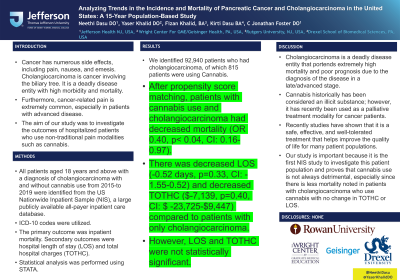Back


Poster Session B - Monday Morning
Category: Biliary/Pancreas
B0011 - Patients With Cannabis Use and Cholangiocarcinoma Have Decreased Inpatient Mortality: A Population-Based Study
Monday, October 24, 2022
10:00 AM – 12:00 PM ET
Location: Crown Ballroom

Has Audio

Neethi Dasu, DO
Jefferson Health New Jersey
Voorhees, NJ
Presenting Author(s)
Neethi Dasu, DO1, Yaser Khalid, DO2, Kirti Dasu, BA3, Fizan Khalid, BA4, C. Jonathan Foster, DO5
1Jefferson Health New Jersey, Voorhees, NJ; 2Wright Center for GME/Geisinger Health System, Scranton, PA; 3Drexel Graduate School of Biomedical Sciences and Professional Studies, Philadelphia, PA; 4Commonwealth Health EMS, Scranton, PA; 5Jefferson Health New Jersey, Cherry Hill, NJ
Introduction: Cancer has numerous side effects, including pain, nausea, and emesis. Cholangiocarcinoma is cancer involving the biliary tree. It is a deadly disease entity with high morbidity and mortality. Furthermore, cancer-related pain is extremely common, especially in patients with advanced disease. The aim of our study was to investigate the outcomes of hospitalized patients who use non-traditional pain modalities such as cannabis.
Methods: All patients aged 18 years and above with a diagnosis of cholangiocarcinoma with and without cannabis use from 2015-to 2019 were identified from the US Nationwide Inpatient Sample (NIS), a large publicly available all-payer inpatient care database. ICD-10 codes were utilized. The primary outcome was inpatient mortality. Secondary outcomes were hospital length of stay (LOS) and total hospital charges (TOTHC). Statistical analysis was performed using STATA.
Results: We identified 92,940 patients who had cholangiocarcinoma, of which 815 patients were using Cannabis. After propensity score matching, patients with cannabis use and cholangiocarcinoma had decreased mortality (OR 0.40, p< 0.04, CI: 0.16-0.97). There was decreased LOS (-0.52 days, p=0.33, CI: -1.55-0.52) and decreased TOTHC ($-7,139, p=0.40, CI: $ -23,725-$9,447) compared to patients with only cholangiocarcinoma. However, LOS and TOTHC were not statistically significant.
Discussion: Cholangiocarcinoma is a deadly disease entity that portends extremely high mortality and poor prognosis due to the diagnosis of the disease in a late/advanced stage. Cannabis historically has been considered an illicit substance, however, it has recently been used as a palliative treatment modality for cancer patients. Recently studies have shown that it is a safe, effective, and well-tolerated treatment that helps improve the quality of life for many patient populations. Our study is important because it is the first NIS study to investigate this patient population and proves that cannabis use is not always detrimental, especially since there is less mortality noted in patients with cholangiocarcinoma who use cannabis with no change in TOTHC or LOS.
Disclosures:
Neethi Dasu, DO1, Yaser Khalid, DO2, Kirti Dasu, BA3, Fizan Khalid, BA4, C. Jonathan Foster, DO5. B0011 - Patients With Cannabis Use and Cholangiocarcinoma Have Decreased Inpatient Mortality: A Population-Based Study, ACG 2022 Annual Scientific Meeting Abstracts. Charlotte, NC: American College of Gastroenterology.
1Jefferson Health New Jersey, Voorhees, NJ; 2Wright Center for GME/Geisinger Health System, Scranton, PA; 3Drexel Graduate School of Biomedical Sciences and Professional Studies, Philadelphia, PA; 4Commonwealth Health EMS, Scranton, PA; 5Jefferson Health New Jersey, Cherry Hill, NJ
Introduction: Cancer has numerous side effects, including pain, nausea, and emesis. Cholangiocarcinoma is cancer involving the biliary tree. It is a deadly disease entity with high morbidity and mortality. Furthermore, cancer-related pain is extremely common, especially in patients with advanced disease. The aim of our study was to investigate the outcomes of hospitalized patients who use non-traditional pain modalities such as cannabis.
Methods: All patients aged 18 years and above with a diagnosis of cholangiocarcinoma with and without cannabis use from 2015-to 2019 were identified from the US Nationwide Inpatient Sample (NIS), a large publicly available all-payer inpatient care database. ICD-10 codes were utilized. The primary outcome was inpatient mortality. Secondary outcomes were hospital length of stay (LOS) and total hospital charges (TOTHC). Statistical analysis was performed using STATA.
Results: We identified 92,940 patients who had cholangiocarcinoma, of which 815 patients were using Cannabis. After propensity score matching, patients with cannabis use and cholangiocarcinoma had decreased mortality (OR 0.40, p< 0.04, CI: 0.16-0.97). There was decreased LOS (-0.52 days, p=0.33, CI: -1.55-0.52) and decreased TOTHC ($-7,139, p=0.40, CI: $ -23,725-$9,447) compared to patients with only cholangiocarcinoma. However, LOS and TOTHC were not statistically significant.
Discussion: Cholangiocarcinoma is a deadly disease entity that portends extremely high mortality and poor prognosis due to the diagnosis of the disease in a late/advanced stage. Cannabis historically has been considered an illicit substance, however, it has recently been used as a palliative treatment modality for cancer patients. Recently studies have shown that it is a safe, effective, and well-tolerated treatment that helps improve the quality of life for many patient populations. Our study is important because it is the first NIS study to investigate this patient population and proves that cannabis use is not always detrimental, especially since there is less mortality noted in patients with cholangiocarcinoma who use cannabis with no change in TOTHC or LOS.
Disclosures:
Neethi Dasu indicated no relevant financial relationships.
Yaser Khalid indicated no relevant financial relationships.
Kirti Dasu indicated no relevant financial relationships.
Fizan Khalid indicated no relevant financial relationships.
C. Jonathan Foster: Conmed – Consultant. Steris – Consultant.
Neethi Dasu, DO1, Yaser Khalid, DO2, Kirti Dasu, BA3, Fizan Khalid, BA4, C. Jonathan Foster, DO5. B0011 - Patients With Cannabis Use and Cholangiocarcinoma Have Decreased Inpatient Mortality: A Population-Based Study, ACG 2022 Annual Scientific Meeting Abstracts. Charlotte, NC: American College of Gastroenterology.
